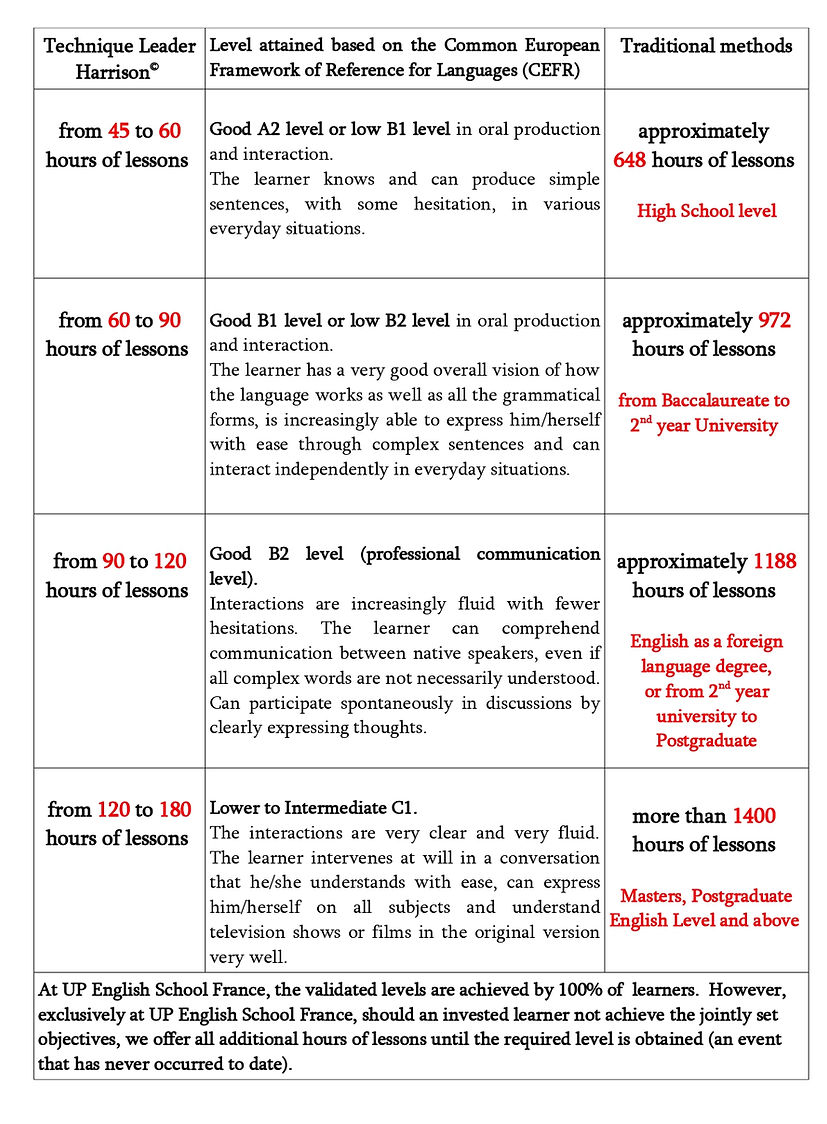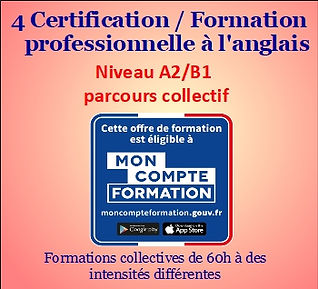

Our English Language

Training Courses
Scientifically designed within our research centre, the Technique Leader Harrison© places innovation, learner performance and above all, human well-being at the heart of its revolutionary language teaching technique. After several years of commitment and rigorous research, we have designed and developed the fastest English language learning technique in the world, and what's more, in the ideal learning environment.

-
Group lessons for adults
-
Schools (from age 10)
- Private lessons
-
Vocational training
-
Group Vocational training (CPF, OPCO, FAFCEA, VIVEA, AGEFICE...)
-
Private vocational training tailored to specific sectors (tourism, industry, business, aeronautics, maritime, aerospace, professional sports, art and culture, high-tech industry, diplomacy)
-
Intensive training courses (sports, politicians, managers, etc.)

Invest in your future!

 |  |
|---|---|
 |  |






Employees, Business Owners,
Job Seekers
UP English School France is a quality-certified and accredited training centre, allowing you to optimise your Personal Training Account, which will financially support your vocational training.
Job seekers: your training course can also be funded by France Travail (formerly Pôle Emploi, the French Job centre).
Our team are by your side throughout your vocational training course application process.
Comparative Acquisition table for Beginners

Number of hours calculated based on more than 300 people using the Technique Leader Harrison©. Data for information purposes only – training course length as indicated on individual quotes.

10 reasons why you should enroll on a
UP English School training course
You will be certain of :
truly learning to speak English 10 times faster while mastering all four language skills.
benefiting from the successful teaching experience of one of the best English language teachers in the French-speaking world.
using an innovative technique that has proved its efficiency.
saving on travel expenses, time and course fees since we are
10 times faster.
receiving a full lesson summary emailed to you after each hour of training, written by Mrs Harrison herself; one of the unique features of our technique is that you save time on note taking).
enjoying yourself while developing your skills in the ideal learning environment.
achieving good results on the CLOE, LANGUAGE CERT, GYMGLISH, TOEIC, TOEFL, BULTATS, and DCL tests, as the Technique Leader Harrison© also allows you to perfect your writing skills.
growing professionally and personally on many levels thanks to our high-quality training courses that have a real intrinsic value.
benefiting from our expertise as we are a quality-certified research and language training centre with a true code of ethics, bound by performance-based obligations.
standing out and offering yourself new perspectives...


Our training courses are adapted for people with disabilities
Adapting to each trainee, whether in group or individual classes, is an integral part of the Technique Leader Harrison's© design. As a result, people with disabilities are not only welcome in our training courses but also thrive during the language acquisition process because they feel that their needs have already been taken into consideration during the preliminary interview, which is the ideal time to discuss how individual requirements will be addressed. This close, trusting relationship allows all our trainees, and particularly those with disabilities, to envisage their course with total peace of mind.
When necessary and with the trainee's consent, we contact their disability advisor at Capemploi, the MDPH, or the AGEFIPH (French Agency for the Protection of Persons with Disabilities) to also take their recommendations into account.
Our disability advisor, Victoria Harrison, has completed the Auvergne-Rhône-Alpes regional "Disability Recognition" training course and supports all trainees from their initial contact through to the end of their course.
UP English School France is also committed to recognising the value of workers with disabilities in the workplace. Not only does more than half of our team have Disability Worker Recognition certification (RTQH), but we are also part of the #progressactivator community to raise awareness among our professional and personal circles that people with disabilities help us all progress, and are a valuable asset to society as a whole.


If you have a disability (or know someone who does), it can be difficult to know where to turn to get the support and assistance you need to help your workplace or society adapt to your needs. We've provided the documents below to help you understand more. Feel free to download them or share them with others. (Documents available in French)
Finally, in order to help further raise public awareness, why not test your knowledge of disability and employment by playing the online game developed by AGEFIPH:
Our team are here to help you through the application process.














